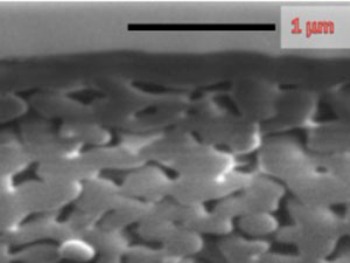Nov 30 2012
The University of Minnesota has been awarded a $1.8 million grant over three years from the Department of Energy's Advanced Research Projects Agency–Energy (ARPA-E) to develop revolutionary membrane technology that will enable energy-efficient separations in the chemical, petrochemical, water, fossil fuel, and renewable energy industries. When fully implemented, the technology could reduce U.S. energy consumption by as much as 3 percent.
 A high-powered microscope shows a thin zeolite membrane (dense top layer) made by depositing nanosheets on a porous support. (Credit: University of Minnesota)
A high-powered microscope shows a thin zeolite membrane (dense top layer) made by depositing nanosheets on a porous support. (Credit: University of Minnesota)
U.S. Secretary of Energy Steven Chu and ARPA-E Deputy Directors Eric Toone and Cheryl Martin publicly announced the ARPA-E awards today. The University of Minnesota's award is specifically aimed at improving efficiencies of industrial processes. The grant money is intended to bridge the gap between academic research and commercial application.
"We have the science, but this grant will allow us to scale up the research and move it closer to market," said lead researcher Michael Tsapatsis, a professor of chemical engineering and materials science in the University's College of Science and Engineering. The other members of the research team are chemical engineering and materials science professors Chris Macosko and Prodromos Daoutidis.
A significant fraction of total energy consumption (approximately 30 percent for the U.S.) is attributed to manufacturing and a major component of this amount is due to energy used in separation and purification processes—as high as 6 percent of the total U.S. energy consumption.
Tsapatsis and his team published research last year about their discovery of a means for developing free-standing, ultra-thin zeolite nanosheets that as thin films can speed up the filtration process and require less energy. Science magazine named the research as one of the biggest breakthroughs of 2011.
While researchers can envision numerous applications, they will focus on separations encountered in biofuel and plastics production. For both applications there is a large existing market, the requirements of which cannot be met by available membrane technologies.
Researchers estimate that for biofuels alone, annual membrane sales of $500 million per year can be anticipated if the technology is fully implemented. Similar levels of sales are expected for the plastics industry bringing total sales to $1 billion per year. If these early applications get commercial traction, other opportunities for the use of nanosheet membranes will emerge as well.
"Our next step is to bring these revolutionary membrane materials to commercial reality by developing a low-cost manufacturing approach that can be scaled-up efficiently," Tsapatsis said.